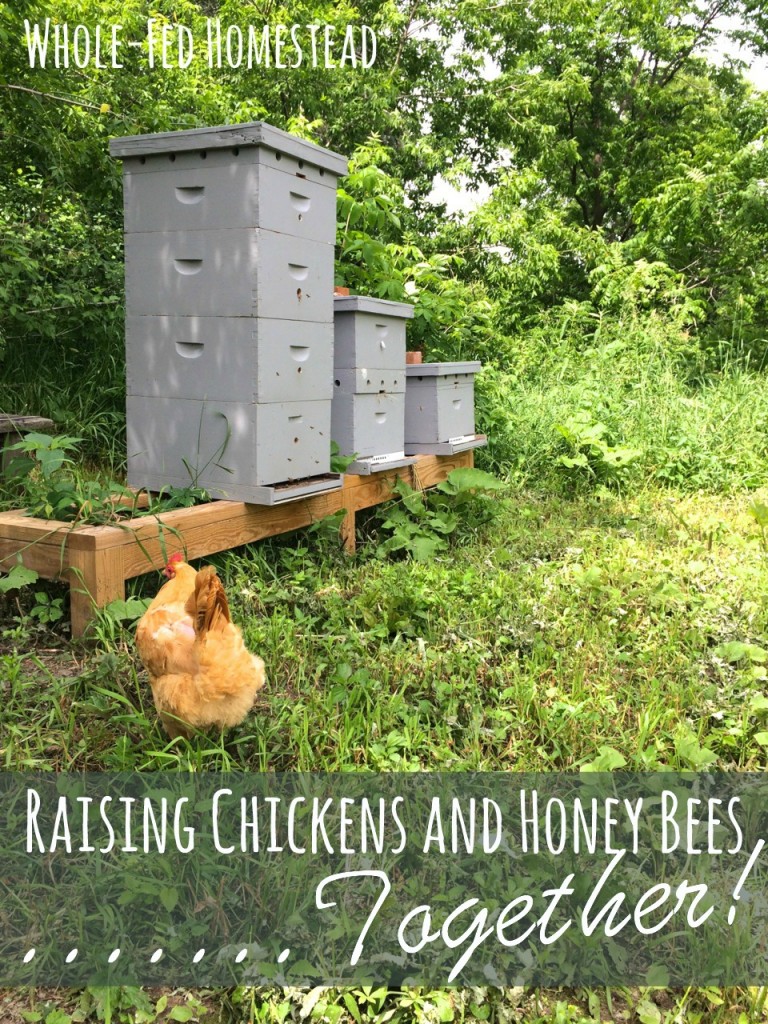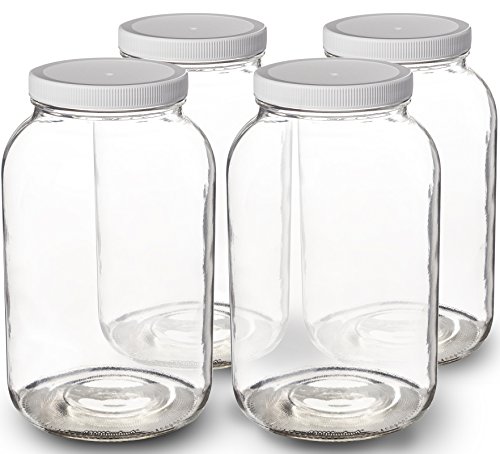
Do chickens and honey bees get along? Can you raise them close together?
The short answer is, well… yes.
I remember last spring when we received our first-ever batch of baby chicks and a couple boxes of bees all in less than a month’s time. I wondered and hoped that I wouldn’t find a band of rogue chickens sitting in front of the hives, picking off honey bees as they flew in.
Much to my delight, that hasn’t been the case.
If you are thinking about keeping chickens and honey bees together- and wondering if the chickens will bother honey bees, or vice versa- will the honey bees bother the chickens, the answer is mostly: no, but like almost everything in life, with a few exceptions.
Our chicken coop is a little over 100 feet from the bee hives. The chickens free range all day long, but during the very cold winter and very hot summer they tend to stay pretty close to their coop. Also, they are spoiled. When its nice (as in, not below freezing) we let them out at about 6am. In the spring and summer I make them fend for themselves until about noon, or until the temperature reaches 75 F, whichever comes first. They get a small amount of feed, take their afternoon siesta, and become active again around 3pm until bedtime.
I only mention this because depending on how hungry your chickens are, and what their day looks like might have an impact on their eagerness to eat bees.
Having some of the better free ranging breeds, like Icelandics or having a more aggressive hive might make a difference. Our free-range-extraordinaire-Easter-Eggers haven’t been a problem for the bees at all. Nor was the one aggressive hive we’ve had a problem for the chickens.
Chickens Around the Hives
There are a few chickens that like to meander around the hives regularly, and I don’t mind a bit. I have observed them a lot and have never seen one pick off a live bee. In fact, they don’t even pay much attention to the front of the hive because they are too busy looking for other goodies on the ground. I am happy that they help to keep the area clean, as they will eat ants, beetles and other bugs that we don’t want around the hives.
And actually, our chickens won’t even eat live or dead bees when I’ve offered them. They do however, go crazy for bee larva… and also the wax. So be careful if feeding larva to the chickens, that they don’t run off with a big piece of honeycomb! Although beeswax is generally digestible, it seems like a good way to get an impacted crop.
Our hives are off the ground a foot or two, so even if a chicken were right in front of the hive, they wouldn’t really be blocking the entrance. I think this is a good idea if you have bees and chickens co-existing. If your hives are right on the ground and a chicken is too close, they might get buzzed by a bunch of busy bees. And it is certainly more tempting to eat incoming bees on the landing board if they are right in front of you. If your hives are not raised and you are getting chickens, just keep an eye on them at first. If it turns out that bee-eating is a problem, you may have to raise the hives or put a fence around them to prevent it. Or just feed the chickens more.
Once I saw Otto the rooster jump on top of one of the hives and let out a cock-a-doodle-doo. Seems like a good, tall place to let everyone know who’s the boss. The bees didn’t care. He jumped down and went about his business. It doesn’t seem like bees perceive chickens as a threat in any way.
I am completely comfortable walking right next to the hives without worry that they will sting me. Unless you’re really up in their business, most honey bee colonies just don’t have the time to bother with anyone or anything not obviously threatening them. A small chicken or two walking by isn’t a big deal to the bees.
An exception to this might be if you are working the hives. Whenever I am outside, the chickens like to follow me around (probably because I always have sunflower seeds in my pocket for them!), including when we are inspecting the hives. Sometimes they come and hang out by us while we are working, and sometimes they don’t. I can tell that they don’t like when the bees are buzzing in a tizzy, because they tend to keep a little more distance. It might be a good idea to have a plan of action in place if you are working in your hives and the chickens are getting too close.
The bottom line: honey bees aren’t a favorite snack of chickens, and unless you have really hungry chickens or really aggressive bees, they actually make a great pair.
Bees Around the Coop
This is what I feel the bigger concern is, and it really isn’t one as long as you take proper precautions.
One day last summer I went out to do a mid-day chicken check and found that the bees had discovered the duck pool… and it was claiming them one by one. I hate accidentally killing even one bee, so to find a couple dozen of them drowning in the pool was aggravating. Come on you guys! Of course, I quickly starting fishing out the live ones and putting them in the sun to dry.
I immediately emptied the pool and and moved it to a new location. Then I gave the bees their own safe water source closer to the hives to ensure that they wouldn’t feel the need to seek out the death-pool again.
Bees really do seem stupid when it comes to water. Even a chicken waterer with much less surface area than a whole kiddie pool could pose a problem if there are no rocks or sticks for overboard bees to use to crawl back out. This is especially true if you live in a really dry climate and natural water sources are hard to find.
You could make your chicken yard completely bee-safe by using chicken nipple waterers. Yes, nipples for chickens. Of course, you still always want to provide a water source for your bees, because you don’t know what kind of situations they could be getting themselves into at a neighbor’s house.
If you find that bees are exploring your chicken’s feed, it may be due to certain herbs that some brands add. This isn’t a big deal, other than the bees are more likely to be eaten if they are hanging around in the food bowl. I mean, they’re pretty much asking for it at that point. If your feed contains Anise Hyssop and your bees are drawn to it, consider switching to a different brand (unless the chickens aren’t eating the bees anyways- then I guess there is nothing to worry about).
The bottom line: ensuring your bees have a safe and always-full water source close by makes them a lot less likely to seek out the chicken’s water. And to further prevent problems, make sure they have water as soon as you add them to your property, because once they find a water source (like the neighbor’s pool) they will keep going back. And you aren’t going to ask the neighbor to drain and move his pool.
There’s really nothing better than walking outside on a warm spring day and hearing the buzz of bees working the apple blossoms and dandelions, and watching the chickens mill about the yard, enjoying the green grass and fresh air. Honey bees and chickens are very complimentary to each other and are both great additions to a homestead.




